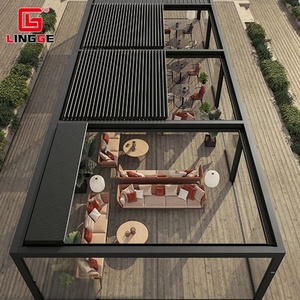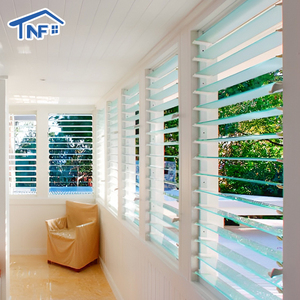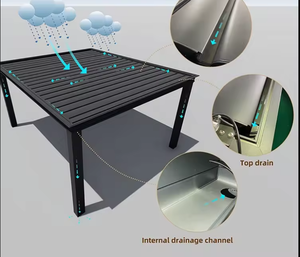(5392 products available)



























































































































































































































A Foshan louvre is a window or door with adjustable slats that allows light and air to enter while keeping out rain and insects. They are made in the city of Foshan, China, known for its advanced manufacturing and modern building technology. These louvres come in different materials, including:
Foshan louvres also come in different types, such as:
Louvre windows are a popular choice for homeowners looking to improve their homes because of their balance of style, functionality, and versatility. Here are some features and functions of a louvre window that a homeowner should pay attention to before purchasing in bulk:
Ventilation
Ventilation is the primary function of louvre windows. The design of these windows, with several narrow and angled panes of glass or other materials, allows for excellent airflow. They can be opened to let in air while keeping rain out. This makes them ideal for areas with warm climates. Louvre windows can also be adjusted to control the amount and direction of air entering a space. This is beneficial for regulating temperature and preventing excessive moisture.
Light
Louvre windows are an excellent source of natural light because of their slats' transparency and arrangement. Homeowners can use louvre windows to light up rooms, which is not only more pleasant but also more environmentally friendly than artificial lighting.
Privacy
Privacy is an important consideration when installing a louvre window. Louvre windows can be strategically positioned to allow airflow and natural light while preventing direct views from the outside. Homeowners can also opt for frosted or tinted glass slats to enhance privacy further while still permitting light to enter.
Security
Louvre windows can provide a certain level of security if they are installed and maintained properly. Some louvre windows have security features like reinforced glass, sturdy frames, and secure locking mechanisms. When closed and locked, these can deter unauthorized entry. Homeowners can improve the security of their louvre windows by installing insect screens or security bars. Regular maintenance, like ensuring the slats are in good condition and the locking mechanisms work properly, also contributes to the overall security.
Design Flexibility
Louvre windows offer a variety of options to improve the aesthetic and functional elements of any room. They come in different materials, such as timber, aluminum, and uPVC, which can be chosen to match a home's style and decor. Homeowners can also customize the size and number of slats, as well as the angle of the slats, to create a unique and personalized look. Additionally, louvre windows can be integrated with other types of windows and doors to enhance the overall design of a space.
Foshan louvres have various applications across different industries and sectors. Here are some common usage scenarios:
Residential Buildings
Louvres are widely used in homes and apartments, especially in warm and sunny areas. They are usually installed in:
- Roofs and windows to allow air circulation and light in while keeping rain and debris out.
- Patios and balconies as sliding or folding doors to enhance ventilation and create a seamless link between indoor and outdoor spaces.
Commercial Establishments
Many commercial spaces, such as shops, restaurants, and hotels, utilize louvres. For instance, in:
- Hotels and resorts, louvres are fitted in guest rooms, common areas, and outdoor spaces to promote ventilation, natural light, and aesthetic appeal.
- Restaurants and cafes, louvres are installed as doors or windows to create a pleasant dining atmosphere and connect with the outdoors.
Industrial Facilities
Louvres are employed in various industrial settings like factories, warehouses, and manufacturing plants. They help to:
- Maintain airflow and regulate temperatures in workspaces and equipment rooms.
- Ventilation louvres are specially designed to exhaust hot air, chemicals, and fumes, ensuring a safe and healthy working environment.
Agricultural Structures
Louvres are used in farming and agricultural applications, such as:
- Greenhouses, to facilitate climate control and optimum plant growth by regulating air, moisture, and temperature.
- Animal housing, including barns and poultry coops, to ensure proper ventilation and prevent overheating or the buildup of harmful gases.
Healthcare Facilities
Hospitals, clinics, and nursing homes utilize louvres to promote ventilation and natural light in patient rooms, treatment areas, and common spaces. This contributes to a healthy and pleasant environment for patients and staff.
Educational Institutions
Schools, colleges, and universities incorporate louvres in classrooms, libraries, and recreational areas. This ensures adequate ventilation, daylight, and a comfortable learning and teaching environment.
Recreational Spaces
Sports centers, gyms, and fitness facilities use louvres to enhance airflow and natural light in workout areas, courts, and swimming pools. This creates a pleasant and energetic environment for exercises and activities.
Parking Lots and Garages
Louvres are employed in parking structures and garages to facilitate air circulation, exhaust fumes, and regulate temperatures. This ensures a safe and healthy atmosphere for parked vehicles and individuals.
Storage Units
Louvres can be utilized in storage facilities and units to promote ventilation and prevent moisture buildup, ensuring the safety of stored items like furniture and electronics.
When selecting the right Foshan louvre for a space, consider the following:
Material and Durability
Think about the louvre's longevity and resilience. Select materials that can survive the climatic conditions and have a suitable aesthetic appeal for the required area. Choose robust materials like aluminum or galvanized steel if the louvres are to be installed in locations subjected to severe weather or operational conditions. These materials are resistant to corrosion and damage. Consider the louvre's longevity and resilience.
Airflow and Ventilation
Prioritize louvre designs that optimize airflow and ventilation. Consider the gap between the blades and their angle. Wider gaps and properly positioned blades allow for better air circulation. Sufficient ventilation is essential for an office's health and energy efficiency.
Adjustability and Control
Look for louvres with adjustable blades. Controllable blades let users change airflow and light levels, improving comfort and energy efficiency. Depending on the design, control options may include manual handles or automated electric systems.
Installation and Maintenance
Consider the louvre's installation process and upkeep. Choose designs that are simple to install and maintain. Consider aspects like the building's structure, the required louvre's size, and any extra elements like motors for automated solutions. To lessen upkeep time and expenses, select louvre designs with simple cleaning procedures and long-lasting materials.
Energy Efficiency
Choose louvres that help the building conserve energy. Look for designs that maximize natural ventilation and light. This decreases the need for artificial cooling and lighting, which lowers energy expenses. Consider automated louvre systems that operate with climate sensors to optimize ventilation and temperature control, thus improving energy efficiency.
Compliance and Safety
Ensure the selected louvres meet local construction regulations and safety standards. Consider factors like fire safety, structural integrity, and accessibility. Some buildings may need particular louvre designs, like fire-rated louvres for smoke compartments or security louvres with reinforced blades and frames.
Q1: What are the benefits of Foshan louvre windows?
A1: Louvre windows offer great ventilation, allowing fresh air to circulate while keeping the rain out. They provide natural light since they can be placed at angles that reduce glare but maximize light. Louvre windows enhance security because they can be locked in various open positions. They are also energy efficient as they allow for natural cooling and heating. Louvre windows are versatile and can be used in different styles of homes.
Q2: What are the disadvantages of louvre windows?
A2: The disadvantages include limited insulation as compared to solid glass windows. They also offer less soundproofing from outside noise. The security of louvre windows is also dependent on the type of glass used. If the glass is weak, it can be easily broken. Louvre windows also require regular maintenance to keep the blades clean and free from dirt and grime.
Q3: What are louvre doors used for?
A3: Louvre doors are used to cover spaces that require ventilation but also want to maintain privacy. They are commonly used in closets, laundry rooms, and utility spaces. Louvre doors can also be used as room dividers to separate spaces while allowing airflow.
Q4: Are louvre doors good?
A4: Yes, louvre doors are good as they provide privacy and ventilation. They are a good choice for utility spaces, closets, and areas that require airflow but need to be screened from view.
Q5: Are louvre doors more expensive than solid doors?
A5: The cost of louvre doors compared to solid doors can vary depending on the materials used and the quality of construction. Generally, louvre doors can be more affordable but solid doors can also be at the same price range. It all depends on the material used.